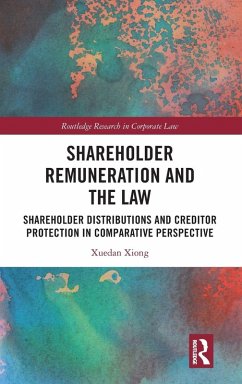
Shareholder Activism and the Law
The Future of US Corporate Governance
Versandkostenfrei!
Versandfertig in 1-2 Wochen
167,99 €
inkl. MwSt.
Weitere Ausgaben:

PAYBACK Punkte
84 °P sammeln!
This book provides a complete framework for contemporary shareholder activism and its implications for US corporate governance, which is based on director primacy theory. Under director primacy theory, shareholders do not wish to be involved in the management of the company; in the rare event that they wish to be involved, it is considered a transfer of power from the board of directors to shareholders, which in turn reduces the efficiency of centralised decision-making in public companies. However, this book demonstrates that shareholders do not use their power to transfer corporate control f...
This book provides a complete framework for contemporary shareholder activism and its implications for US corporate governance, which is based on director primacy theory. Under director primacy theory, shareholders do not wish to be involved in the management of the company; in the rare event that they wish to be involved, it is considered a transfer of power from the board of directors to shareholders, which in turn reduces the efficiency of centralised decision-making in public companies. However, this book demonstrates that shareholders do not use their power to transfer corporate control from the board to themselves, and that some form of shareholder activism is even collaborative, which is a new paradigm for US corporate governance. This book shows that while monitoring remains a key contribution of shareholders, they also bring new informational inputs to corporate decision-making that could not be obtained under the traditional board model. Accordingly, contemporary shareholder activism enhances the board's decision-making and monitoring capacity, without undermining the economic value of the board's authority. Therefore, this book argues that the complete approach of contemporary shareholder activism should be accommodated into US corporate governance. In doing so, this book considers not only legal and regulatory developments in the wake of the 2007-2008 financial crisis, but also the governance developments through by-law amendments. Furthermore, the author makes several recommendations to soften the current director primacy model: establishing a level playing field for private ordering, adopting the proxy access default regime, the majority voting rule, the universal proxy rules, and enhancing the disclosure requirements of shareholders. The book will be of interest to academics and students of corporate governance, both in the US and internationally.














